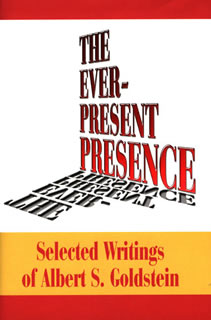
This is not only a book, but a rare opportunity to glimpse the soul of a modern rabbi in Israel. As you peruse the essays, sermons, and messages delivered by Albert S. Goldstein, you will be drawn again and again to the central message that he both envisaged and embodied. He explains it best in his own words, taken from the title sermon, “The Ever-Present Presence.”
The famous tzadik, Rabbi Levi Yitzhak of Berdichev, ordered his shamash, his private secretary, to go to every store in the marketplace and tell the busy Jewish businessmen there to shut their shops and assemble on the town common to hear a momentous announcement which the rabbi most urgently needed to make to them and, of course, which they most desperately needed to hear and respond to.
“But Rabbi,” the shamash protested, “today is a market day. Everyone is busy with selling and buying. And this is the very busiest time of the day. Could you not wait for Shabbat, when they will be in shul, anyway? Or, if it must be today, then for some other time, say, on their way home from work?” “No!” said the tzadik, “Go and tell them what I have said: that Levi Yitzhak son of Sarah of Berdichev, has an urgent message for them, which cannot wait a day or even an hour. And they must stop their trading, and close their stores, and come to the town center and hear what I have to tell them.”
Grumbling and unhappy, yet wondering what could be of such enormous urgency, the Jewish merchants of Berdichev complied. They locked their stores and gathered on the common. When all had assembled, the tzadik mounted a box in their midst and began to speak. “I have asked you to close your shops and come here, even at this busy season, on this busy day, in this busy hour, because I have news of tremendous importance for all of you, tidings which could not be postponed for another day or for another hour. And this is my proclamation: I, Levi Yitzhak ben Sarah of Berditchev, machriz umodia lachem, ‘announce and proclaim to you’: There is a God in the world!”
There is indeed a God in the world—not only in the heaving bosom of the ocean deeps and the glistening snow fields on mountain tops and the unimaginably vast spaces of the firmament, dotted with uncountable suns and planets—but in our businesses, our stores and offices, and streets and homes. There, it is we who manifest His presence. There, we are the instruments with which He operates. What we do, and say, and are, there testify to His existence, His reality—or witness against it. As, at daybreak or sunset, there are light waves, but no glorious vision of splendor in the skies, unless there are eyes to see it. And, as in a forest, when a tree falls, or a nightingale sings, there are airwaves but no sound, unless there is an ear to hear it, a brain to translate it—so, in our busy workaday world, there is no voice of God, unless our tongue gives utterance to it; no power of God, unless our hand expresses it; no truth, or beauty, or glory of God, unless our labor and loving concern manifest it as we speak to another human being, whether it be client or colleague or child or parent or patron or patient or spouse or sibling; each time we use a hand, whether to sign a check or set a table or caress a loved one or comfort a suffering fellow mortal.
Throughout this book Goldstein asks us again and again, in a hundred different ways, “Is there any Levi Yitzhak today who could make us close our shops and offices and studies for an hour to proclaim the awesome, overwhelming news that there is a God in the world?” In your hands, dear reader, is a rare opportunity to encounter God in the world through the work and the soul of a devoted servant.
